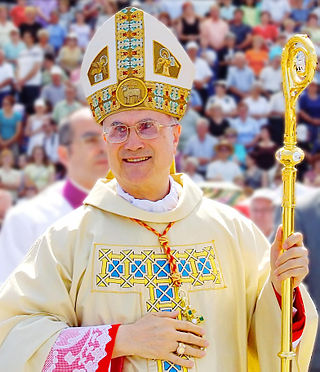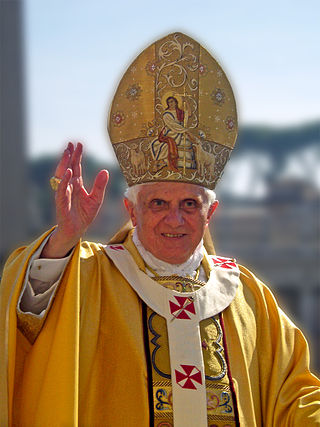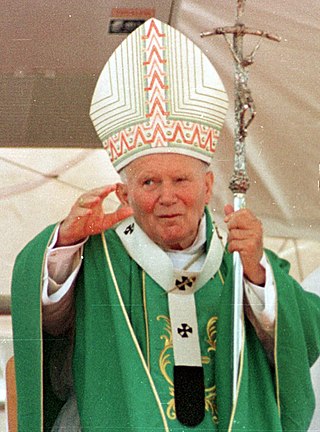Related Research Articles

Pope Benedict XVI was the head of the Catholic Church and sovereign of the Vatican City State from 19 April 2005 until his resignation on 28 February 2013. Benedict's election as pope occurred in the 2005 papal conclave that followed the death of Pope John Paul II. Benedict chose to be known as "Pope emeritus" upon his resignation, and he retained this title until his death in 2022.
Modernism in the Catholic Church describes attempts to reconcile Catholicism with modern culture, specifically an understanding of the Bible and Catholic tradition in light of the historical-critical method and new philosophical and political developments of the late 19th and early 20th centuries.
Catholic social teaching (CST) is an area of Catholic doctrine which is concerned with human dignity and the common good in society. It addresses oppression, the role of the state, subsidiarity, social organization, social justice, and wealth distribution. CST's foundations are considered to have been laid by Pope Leo XIII's 1891 encyclical, Rerum novarum, which advocated distributism. Its roots can be traced to Catholic theologians such as Thomas Aquinas and Augustine of Hippo. CST is also derived from the Bible and cultures of the ancient Near East.

The Catholic Church holds no official position on the theory of creation or evolution, leaving the specifics of either theistic evolution or literal creationism to the individual within certain parameters established by the Church. According to the Catechism of the Catholic Church, any believer may accept either literal or special creation within the period of an actual six-day, twenty-four-hour period, or they may accept the belief that the earth evolved over time under the guidance of God. Catholicism holds that God initiated and continued the process of his creation, that Adam and Eve were real people, and that all humans, whether specially created or evolved, have and have always had specially created souls for each individual.

Tarcisio Pietro Evasio Bertone is an Italian prelate of the Catholic Church and a Vatican diplomat. A cardinal since 2003, he served as Archbishop of Vercelli from 1991 to 1995, as Secretary of the Congregation for the Doctrine of the Faith, Archbishop of Genoa from 2002 to 2006, and as Cardinal Secretary of State from 2006 to 2013. On 10 May 2008, he was named Cardinal-Bishop of Frascati.

Humanum genus is a papal encyclical promulgated on 20 April 1884 by Pope Leo XIII.

The theology of Pope Benedict XVI, as promulgated during his pontificate, consists mainly of three encyclical letters on love (2005), hope (2007), and "charity in truth" (2009), as well as apostolic documents and various speeches and interviews. Pope Benedict XVI's theology underwent developments over the years, many of which were characterized by his leadership position in the Congregation for the Doctrine of the Faith, which is entrusted with preserving the Catholic faith in its entirety.

The teachings of Pope John Paul II are contained in a number of documents. It has been said that these teachings will have a long-lasting influence on the Church.

The Pontifical Academy of Sciences is a scientific academy of the Vatican City, established in 1936 by Pope Pius XI. Its aim is to promote the progress of the mathematical, physical, and natural sciences and the study of related epistemological problems. The Accademia Pontificia dei Nuovi Lincei was founded in 1847 as a more closely supervised successor to the Accademia dei Lincei established in Rome in 1603 by the learned Roman Prince, Federico Cesi (1585–1630), who was a young botanist and naturalist, and which claimed Galileo Galilei as its president. The Accademia dei Lincei survives as a wholly separate institution.
Humani generis is a papal encyclical that Pope Pius XII promulgated on 12 August 1950 "concerning some false opinions threatening to undermine the foundations of Catholic Doctrine". It primarily discussed, the encyclical says, "new opinions" which may "originate from a reprehensible desire of novelty" and their consequences on the Church.
The Nouvelle théologie is an intellectual movement in Catholic theology that arose in the mid-20th century. It is best known for Pope John XXIII's endorsement of its closely-associated ressourcement idea, which shaped the events of the Second Vatican Council. It existed most notably among certain circles of French and German theologians.

The theology of Pope Pius XII is reflected in his forty-one encyclicals, as well as speeches and nearly 1000 messages, during his almost 20-year pontificate. The encyclicals Mystici corporis and Mediator Dei advanced the understanding of membership and participation in the Catholic Church. The encyclical Divino afflante Spiritu began opening the door to historical-critical biblical studies. But his magisterium was far larger and is difficult to summarize. In numerous speeches Catholic teaching is related to various aspects of life, education, medicine, politics, war and peace, the life of saints, Mary, the mother of God, things eternal and temporal.

Social teachings of Pope Pius XII refers to encyclicals, apostolic constitutions and speeches by Pope Pius XII on non-theological issues involving medicine, science, education, social justice, family and sexuality, and occupations.

The Mariology of the popes is the theological study of the influence that the popes have had on the development, formulation and transformation of the Roman Catholic Church's doctrines and devotions relating to the Blessed Virgin Mary.
The theology on the body is a broad term for Catholic teachings on the human body.
The post–Vatican II history of the Catholic Church is the recent history of the Catholic Church since the Second Vatican Council (1962–1965).
The relations between Pope Benedict XVI and Judaism remained fairly good, although concerns were raised by Jewish leaders over the political impact of Traditionalists in the Church during the papacy of Benedict.
The canonization process of Pope Pius XII dates to shortly after his death in 1958. He was declared a servant of God in 1990 and venerable in 2009. Father Peter Gumpel was the relator of Pius XII's cause for canonization. The potential beatification of Pius XII has raised concern, especially by Jewish organisations, because of his controversial record during the Holocaust. The objections especially arise because of the refusal by the Vatican to allow independent access to the Vatican's archives for the period of Pius XII's papacy.

The relationship between science and the Catholic Church is a widely debated subject. Historically, the Catholic Church has been a patron of sciences. It has been prolific in the foundation and funding of schools, universities, and hospitals, and many clergy have been active in the sciences. Some historians of science such as Pierre Duhem credit medieval Catholic mathematicians and philosophers such as John Buridan, Nicole Oresme, and Roger Bacon as the founders of modern science. Duhem found "the mechanics and physics, of which modern times are justifiably proud, to proceed by an uninterrupted series of scarcely perceptible improvements from doctrines professed in the heart of the medieval schools." Historian John Heilbron says that "The Roman Catholic Church gave more financial and social support to the study of astronomy for over six centuries, from the recovery of ancient learning during the late Middle Ages into the Enlightenment, than any other, and probably all, other Institutions." The conflict thesis and other critiques emphasize the historical or contemporary conflict between the Catholic Church and science, citing, in particular, the trial of Galileo as evidence. For its part, the Catholic Church teaches that science and the Christian faith are complementary, as can be seen from the Catechism of the Catholic Church which states in regards to faith and science:
Though faith is above reason, there can never be any real discrepancy between faith and reason. Since the same God who reveals mysteries and infuses faith has bestowed the light of reason on the human mind, God cannot deny himself, nor can truth ever contradict truth. ... Consequently, methodical research in all branches of knowledge, provided it is carried out in a truly scientific manner and does not override moral laws, can never conflict with the faith, because the things of the world and the things of faith derive from the same God. The humble and persevering investigator of the secrets of nature is being led, as it were, by the hand of God despite himself, for it is God, the conserver of all things, who made them what they are.
This is a list of the lists of encyclicals which have been promulgated by Popes of the Catholic Church.
References
- ↑ Aleteia: The oldest hospital in Europe was founded by a pope
- ↑ Scott, Michon (March 26, 2017). "Conrad Gesner". Strange Science: The rocky road to modern paleontology and biology. Retrieved 1 May 2020.
- ↑ See Wikisource English translation of the (Latin) 1582 papal bull 'Inter gravissimas' instituting Gregorian calendar reform.
- ↑ From the Inquisition's sentence of June 22, 1633 (de Santillana, 1976, pp.306-10; Finocchiaro 1989, pp. 287-91)
- ↑ Papal Encyclicals: Decrees of Vatican Council I The same holy mother church holds and teaches that God, the source and end of all things, can be known with certainty from the consideration of created things, by the natural power of human reason: ever since the creation of the world, his invisible nature has been clearly perceived in the things that have been made...Even though faith is above reason, there can never be any real disagreement between faith and reason, since it is the same God who reveals the mysteries and infuses faith, and who has endowed the human mind with the light of reason.
- ↑ (Leo XIII, Providentissimus Deus 18)
- ↑ Discourse of His Holiness Pope Pius XII given on 3 December 1939 at the Solemn Audience granted to the Plenary Session of the Academy, Discourses of the Popes from Pius XI to John Paul II to the Pontifical Academy of the Sciences 1939-1986, Vatican City, p.34
- ↑ Linder, Doug. "The Vatican's View of Evolution: Pope Paul II and Pope Pius". law2.umkc.edu. Retrieved 2017-05-23.
- ↑ Fides et Ratio Archived November 26, 2011, at the Wayback Machine ; Pope John Paul II
- ↑ Vatican.Va John Paul II, Veritatis Splendor 80
- ↑ NBC News: Pope: Creation vs. evolution clash an ‘absurdity’
- ↑ Mullady, B. (2011). "Pope Benedict XVI on the Priesthood and Homosexuality". The Linacre Quarterly. 78 (3): 294–305. doi:10.1179/002436311803888311. PMC 6026964 . PMID 30082950.
- ↑ Catholic News Agency: Pope Benedict XVI Spiritual Testament
- ↑ CNA: Pope Francis: ‘There cannot and must not be any opposition between faith and science’
- ↑ La Civilta Cattolica: “Freedom Scares Us”: Pope Francis’ conversation with Slovak Jesuits